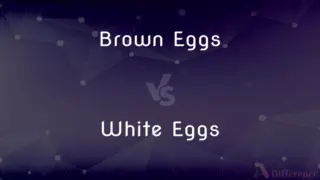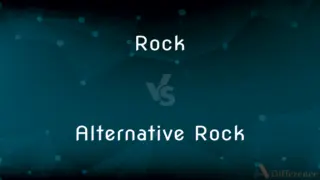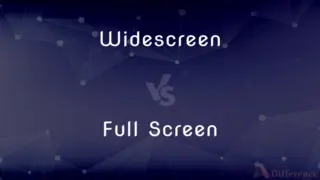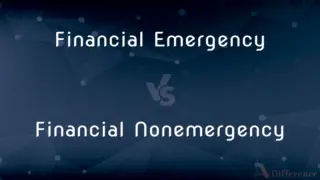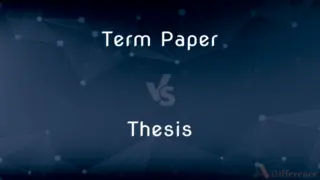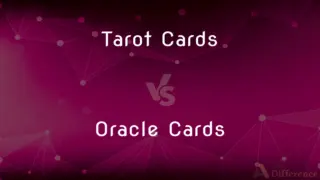Meeting vs. Interview — What's the Difference?
By Tayyaba Rehman & Fiza Rafique — Updated on February 24, 2024
A meeting is a gathering of individuals to discuss various topics, often involving collaboration and decision-making, while interview is a more structured interaction, typically between two parties, focusing on assessment or information exchange.

Difference Between Meeting and Interview
Table of Contents
ADVERTISEMENT
Key Differences
Meetings are collaborative sessions where participants engage in discussions, share ideas, and work towards common goals or solutions. They can vary in formality, purpose, and size, ranging from informal catch-ups to formal corporate strategy sessions. In contrast, interviews are structured interactions with a clear purpose, usually involving an interviewer and an interviewee. They are commonly used for job candidate evaluations, research, or media purposes, where the interviewer seeks to assess the interviewee's suitability, gather information, or gain insights on specific topics.
In meetings, participants have roles but share a more equal footing, contributing to discussions and decision-making processes. The agenda might be broad, covering multiple topics. Interviews, however, have a defined dynamic, with the interviewer leading the session and the interviewee responding to questions or prompts, often within a narrower scope focused on the interviewee's experiences, opinions, or qualifications.
The outcome of a meeting might be a set of decisions, action items, or a shared understanding of discussed topics. For interviews, the outcome is typically the interviewer's evaluation of the interviewee's responses or the information gathered during the interaction. While meetings emphasize collaboration and collective input, interviews focus on assessment, information exchange, and the establishment of a narrative or understanding based on the interviewee's responses.
Meetings are a staple in business and organizational settings, serving as a platform for management, collaboration, and operational discussions. Interviews, while also used in business for recruitment, are prevalent in various other fields, including journalism, research, and law enforcement, serving as a tool for inquiry and evaluation.
Understanding the differences between meetings and interviews is crucial for effective communication and interaction in professional and academic environments. Each serves distinct purposes, follows different structures, and yields unique outcomes, highlighting the importance of context and objectives in determining the most appropriate form of interaction.
ADVERTISEMENT
Comparison Chart
Purpose
Discuss, decide, collaborate on various topics
Assess, gather information, or gain insights
Participants
Multiple, with potentially equal roles
Typically two parties: interviewer and interviewee
Structure
Can vary from informal to formal, multiple topics
Structured, with a focus on the interviewee
Outcome
Decisions, action items, shared understandings
Evaluation of responses, information gathered
Common Settings
Business, organizational, community
Job recruitment, research, journalism
Compare with Definitions
Meeting
A gathering for discussion and decision-making.
The team held a meeting to finalize the project details.
Interview
A structured interaction focusing on assessment.
The job interview focused on the candidate's managerial skills.
Meeting
Can be formal or informal, with multiple attendees.
During the informal meeting, they brainstormed new ideas.
Interview
Aims to gather information or insights.
The research interview provided valuable data for the study.
Meeting
Aims to foster collaboration and share information.
The monthly staff meeting addressed various operational updates.
Interview
Usually involves an interviewer and an interviewee.
The interviewer asked detailed questions about her experience.
Meeting
Participants contribute to the conversation.
Everyone contributed valuable insights at the strategy meeting.
Interview
Follows a specific set of questions or topics.
The interview covered his career progression and future goals.
Meeting
Outcomes include actionable steps or decisions.
The meeting concluded with a clear action plan for the next quarter.
Interview
Outcomes are evaluations or collected information.
The interview offered deep insights into the issue.
Meeting
A meeting is when two or more people come together to discuss one or more topics, often in a formal or business setting, but meetings also occur in a variety of other environments. Many various types of meetings exist.
Interview
A meeting of people face to face, especially for consultation.
Meeting
The act or process or an instance of coming together; an encounter.
Interview
An interview is essentially a structured conversation where one participant asks questions, and the other provides answers. In common parlance, the word "interview" refers to a one-on-one conversation between an interviewer and an interviewee.
Meeting
An assembly or gathering of people, as for a business, social, or religious purpose.
Interview
A formal meeting in person, especially one arranged for the assessment of the qualifications of an applicant.
Meeting
The act of persons or things that meet.
Meeting him will be exciting.
I enjoy meeting new people.
Interview
A conversation in person (or, by extension, over the telephone, Internet etc.) between a journalist and someone whose opinion or statements he or she wishes to record for publication, broadcast etc.
The reporter gave the witness an interview.
Meeting
A place or instance of junction or intersection; a confluence.
Earthquakes occur at the meeting of tectonic plates.
Interview
A formal meeting, in person, for the assessment of a candidate or applicant.
It was a dreadful interview; I have no hope of getting the job.
Meeting
A coming together; an assembling; as, the meeting of Congress.
Interview
A mutual sight or view; a meeting face to face; usually, a formal or official meeting for consultation; a conference; as, the secretary had an interview with the President.
Meeting
The social act of assembling for some common purpose;
His meeting with the salesmen was the high point of his day
Interview
To have an interview with; to question or converse with, especially for the purpose of obtaining information for publication.
Meeting
A small informal social gathering;
There was an informal meeting in my livingroom
Interview
The questioning of a person (or a conversation in which information is elicited); often conducted by journalists;
My interviews with teen-agers revealed a weakening of religious bonds
Interview
Discuss formally with (somebody) for the purpose of an evaluation;
We interviewed the job candidates
Common Curiosities
Can an interview be part of a meeting?
Yes, interviews can occur within meetings, especially in assessment or evaluative contexts.
What are key elements of a successful interview?
Clear objectives, well-prepared questions, active listening, and effective communication.
Can meetings be held virtually?
Yes, with advancements in technology, virtual meetings have become commonplace.
What is the main purpose of a meeting?
To discuss topics, make decisions, and collaborate on tasks or projects.
How should one prepare for a meeting?
By reviewing the agenda, preparing relevant materials, and considering key points to discuss.
How can one improve their interview skills?
Through practice, feedback, and refining communication and listening skills.
Can a meeting have only two participants?
Yes, although typically involving more, meetings can be effective with just two participants.
How are meeting agendas set?
Agendas are usually set by the meeting organizer or leader, based on the meeting's objectives.
What makes an interview question effective?
Effective questions are clear, open-ended, and directly related to the interview's purpose.
What types of interviews are there?
Job interviews, informational interviews, research interviews, and media interviews are common types.
Is it important to follow up after a meeting?
Yes, follow-ups ensure accountability and progress on action items discussed.
How can technology facilitate meetings?
Technology offers tools for virtual meeting platforms, collaboration, and document sharing.
Is it necessary to dress formally for a virtual interview?
While it can depend on the context, presenting oneself professionally, even in virtual settings, is often advisable.
What is the role of a facilitator in a meeting?
A facilitator guides the discussion, ensures participation, and helps achieve the meeting's objectives.
What role does body language play in an interview?
Body language can significantly impact the impression given and received during an interview.
Share Your Discovery

Previous Comparison
Brahman vs. Brahmin
Next Comparison
Foreman vs. GangerAuthor Spotlight
Written by
Tayyaba RehmanTayyaba Rehman is a distinguished writer, currently serving as a primary contributor to askdifference.com. As a researcher in semantics and etymology, Tayyaba's passion for the complexity of languages and their distinctions has found a perfect home on the platform. Tayyaba delves into the intricacies of language, distinguishing between commonly confused words and phrases, thereby providing clarity for readers worldwide.
Co-written by
Fiza RafiqueFiza Rafique is a skilled content writer at AskDifference.com, where she meticulously refines and enhances written pieces. Drawing from her vast editorial expertise, Fiza ensures clarity, accuracy, and precision in every article. Passionate about language, she continually seeks to elevate the quality of content for readers worldwide.
















